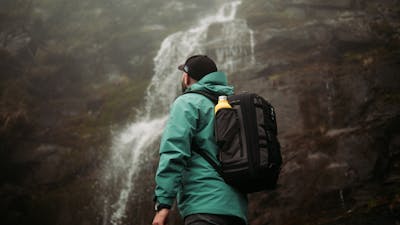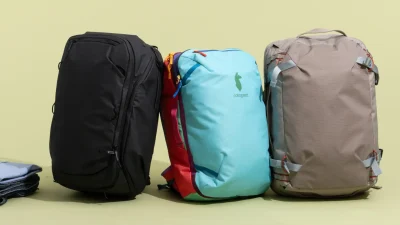When preparing for air travel, one question many travelers ponder is whether a backpack cover is a necessary addition to their packing list. A backpack cover can provide protection against various elements and conditions, but the decision to use one ultimately depends on individual needs and travel styles. In this article, we’ll explore the benefits and drawbacks of using a backpack cover for air travel, helping you make an informed choice for your journey.
Understanding Backpack Covers
A backpack cover is a protective layer, typically made of waterproof or water-resistant material that fits over your backpack. It can shield your bag from rain, snow, dirt, and other elements, ensuring that your belongings stay dry and clean. These covers are lightweight and easy to pack, making them a potentially convenient accessory for travelers.
Backpack covers come in various sizes and designs to fit different backpack styles. Some are designed to fit snugly, while others may be adjustable, allowing for more versatility. When considering whether to bring a backpack cover for your air travel, it’s essential to take a closer look at how they might enhance your overall travel experience.
Weather Protection
One of the most apparent benefits of using a backpack cover during air travel is weather protection. Airports and cities can experience unpredictable weather changes, especially if you are traveling to a different climate. Rain, snow, or even heavy fog can all affect your belongings, particularly if you have electronics, clothing, or important documents packed away.
While many backpacks come with some level of water resistance, a dedicated cover can provide an extra layer of security. A quality cover ensures that your bag remains fully waterproof, giving you peace of mind during sudden downpours or if you’re caught outside for an extended period. This advantage is particularly relevant for outdoor enthusiasts or those who plan to explore cities with uncertain weather patterns.
Protection from Scuffs and Scratches
Travel can often involve baggage handlers, crowded airports, and bus terminals where your bag may get knocked around. In these busy environments, scuffs and scratches can detract from the appearance of your backpack. A backpack cover acts as a barrier that protects your bag from rough handling, drops, and other potential damages.
If you have invested in a quality backpack, it makes sense to protect it from unnecessary wear and tear. A cover adds an additional layer of defense, ensuring that your bag remains in good condition throughout your travels. Not only does this help maintain the aesthetic of your backpack, but it also promotes longevity, saving you from the need for costly repairs or replacements.
Organization and Privacy
Besides physical protection, a backpack cover can offer a layer of privacy. When waiting for flights or traveling through busy transit hubs, your belongings may be visible from all angles. A cover can help conceal what’s inside, reducing the chance of theft or unwanted attention.
Moreover, many covers come with additional features like pockets or compartments for storing smaller items. This added organization can help streamline your travel experience, allowing for convenient access while keeping your essentials out of sight. This feature can be particularly beneficial if you have items like snacks, travel documents, or electronic devices that you need to reach quickly.
Ease of Use
Using a backpack cover is generally straightforward and won’t add much to your packing process. Most covers are designed to be easily slipped over your bag, so you can quickly secure them when needed. They intentionally pack down to a small size, easily fitting into one of your backpack pockets or even a larger suitcase when not in use.
The lightweight nature of these covers means they won’t add significant weight to your luggage, making them an ideal addition if you want to minimize your bag’s weight. This practicality also means that even if you only occasionally need the cover, having it on hand won’t be a hassle, and it can prove invaluable when unpredictable weather strikes.
Cost vs. Value
When considering a backpack cover, one question many travelers ask is whether the cost justifies the potential benefits. Backpack covers are generally affordably priced, with many good-quality options available on the market. The investment can often be minimal compared to the potential savings from avoiding damage to your backpack and contents.
However, it’s essential to assess your travel habits. If you frequently find yourself traveling in areas where inclement weather is common, or if your travels often result in the bag being subjected to rough handling, the value of purchasing a cover becomes even clearer. For occasional travelers flying to temperate climates, it might be a consideration to weigh carefully according to personal preference.
Do You Really Need One?
Whether you need a backpack cover depends on a variety of factors. If you prioritize protecting your belongings and extending the lifespan of your backpack, then a cover could be a wise investment. It is especially recommended for travelers who often find themselves in varied environments or who plan to engage in outdoor adventures post-flight.
On the other hand, if you are a traveler who frequently packs lightly and sticks to urban areas with predictable weather, you may not feel it’s necessary to carry a cover. Your individual travel style, destination weather, and the types of activities you plan to engage in can all influence your decision.
Tips for Choosing the Right Backpack Cover
If you decide that a backpack cover is right for you, here are some tips for choosing the best one.
Size and Fit: Ensure that the cover you select matches the dimensions of your backpack. Look for adjustable features or ones that offer a snug fit to keep it secure during travel.
Material: Opt for covers made from durable, waterproof, and breathable materials. Look for high-quality stitching and seams to ensure lasting use.
Weight: Choose a lightweight option, so it won’t add unnecessary bulk or weight to your travel load.Additional Features: Consider covers with extras, such as reflective strips for safety, storage pockets, or elastic bands for a tighter fit.
- Price Point: Compare different options within your budget but keep quality in mind. Sometimes spending a little more can yield a significantly better product.
Conclusion
In summary, a backpack cover can prove beneficial for air travel, providing protection against weather elements, rough handling, and maintaining the privacy of your belongings. While not an essential item for every traveler, the cover can be especially valuable for those who frequently encounter unpredictable weather or engage in outdoor adventures. Ultimately, assessing your travel habits and needs will help determine whether investing in a backpack cover is worthwhile, enhancing your overall travel experience.
FAQs
Can I use a regular rain poncho instead of a backpack cover?
Yes, a rain poncho can offer some protection; however, it may not fit as snugly as a backpack cover. Additionally, it might not protect against scuffs and scratches as effectively.
Are all backpack covers waterproof?
Not all backpack covers are fully waterproof. It’s advisable to look for covers made of high-quality waterproof materials to ensure effective protection.
Can I find a backpack cover that fits multiple backpacks?
Yes, some covers are designed to be adjustable to fit various backpack types and sizes. Make sure to check the specifications before purchasing.
How do I clean a backpack cover?
Most covers can be wiped down with a damp cloth. Check the manufacturer’s instructions for specific cleaning recommendations to maintain the cover’s integrity.
Is it worth carrying a backpack cover if I travel by air infrequently?
If you travel infrequently but tend to go to places with inconsistent weather, a backpack cover can be a smart addition. It won’t take up much space but could save you from damaged belongings.

